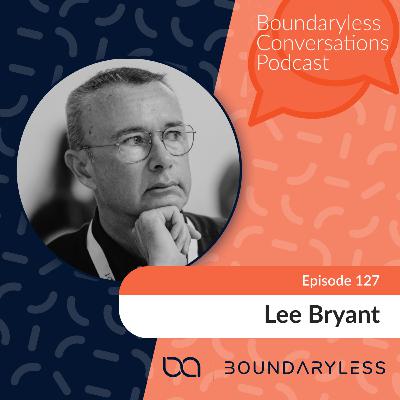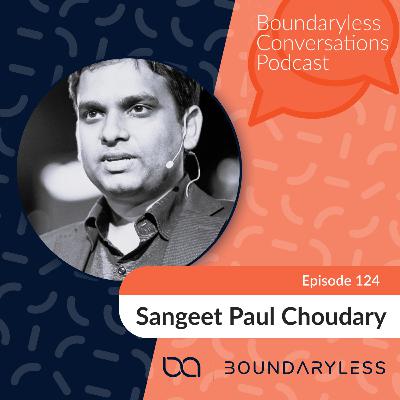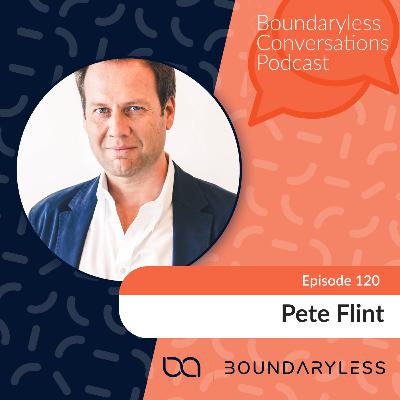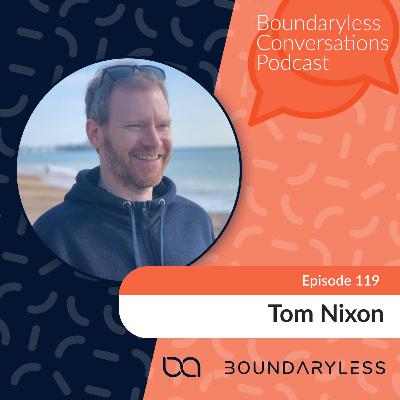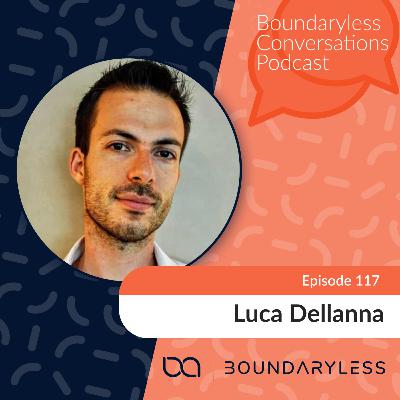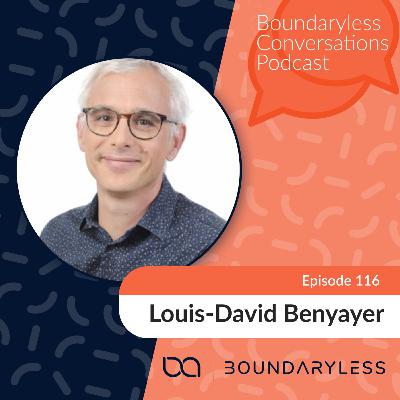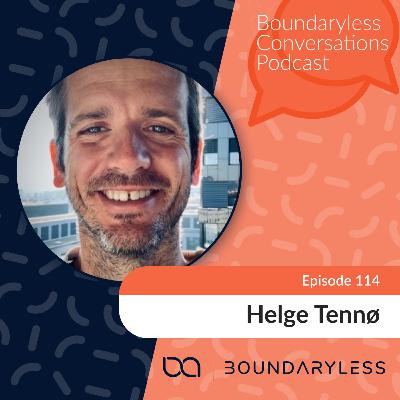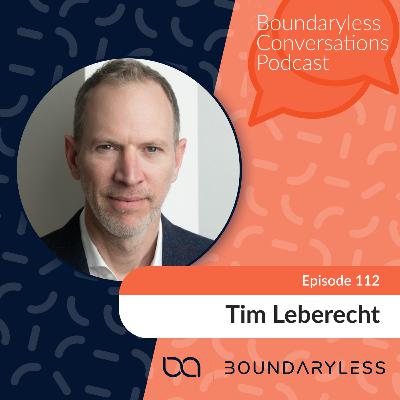Discover Boundaryless Conversations Podcast
Boundaryless Conversations Podcast

Boundaryless Conversations Podcast
Author: Boundaryless SRL
Subscribed: 43Played: 916Subscribe
Share
© Boundaryless SRL
Description
Boundaryless Conversations Podcast is an ongoing exploration of the future of Platforms & Ecosystems.
Here we explore new perspectives about how we organise at scale in a rapidly changing world.
From Boundaryless SRL
Hosted by Simone Cicero and Shruthi Prakash
Here we explore new perspectives about how we organise at scale in a rapidly changing world.
From Boundaryless SRL
Hosted by Simone Cicero and Shruthi Prakash
133 Episodes
Reverse
Lisa Gill - a coach, facilitator, and host of the acclaimed Leadermorphosis podcast - joins us to explore the evolving world of self-managing organisations.Drawing on over a decade of experience and examples from companies like Buurtzorg and her own work at TUFF Leadership, Lisa speaks about what makes radically decentralised organisations work: dynamic hierarchies, enabling structures, and accountability without coercion.Drawing on lessons from allied fields such as social justice and disability justice, she emphasises that accountability is a relational practice rather than a top-down mechanism, and that true accountability requires choice, trust, and transparent communication.This episode is packed with essential insights and practical nuggets that you can take back and reflect on, so don’t miss out.In this episode, Lisa takes us deep into the realities of implementing self-management and radically decentralised organisations in practice.Reflecting on the self-management movement's trajectory, she discusses the concept of the "green trap" - a common organisational sticking point - and uses it to emphasise why psychological comfort without sufficient accountability is unsustainable.She also covers several other core topics for the future of decentralised organisations - like the five organisational systems, the importance of inner shifts, what it means to create environments where people can sit in discomfort, learn, and grow without relying on coercion, and so much more.Key Highlights👉 Self-managing organisations thrive on dynamic hierarchies, enabling structures, and distributed decision-making rather than rigid top-down control.👉 Accountability works best as a relational practice grounded in choice, trust, and transparent communication, not coercion.👉 True accountability requires freedom: individuals must be able to say no for their yes to be meaningful and fully owned.👉 Balancing care and performance creates spaces for development where individuals and teams can grow sustainably.👉 Psychological safety paired with challenge fosters both learning and innovation, avoiding the traps of comfort or anxiety extremes.👉 Exposure to real consequences - like zero distance to customers - builds responsibility and encourages self-correcting behaviour.👉 Both market performance and human-centred care can coexist when organisations prioritise autonomy, clarity, and alignment on values.👉 Commitment-keeping and follow-through are foundational principles for self-managing, high-trust organisations.Topics /chapters(00:00) Why I Don’t Call it “Self-Management” Anymore - INTRO(01:22) Introducing Lisa Gill(03:19) Introducing Self-Management(11:41) Radically decentralised organisations and the future of Collaboration(19:03) Operationalizing Decentralization in Self-Managing organisations(24:56) Learnings on Self-Reflection from Allied Industries(30:10) What's the Future of Self-Management?(38:22) Enabling Ecosystemic Transformation(44:18) Breadcrumbs and SuggestionsRemember that you can always find transcripts and key highlights of the episode on our website: https://www.boundaryless.io/podcast/gill-lisaEpisode recorded on Oct 17, 25Find out more about the show and the research at Boundaryless at https://boundaryless.io/resources/podcast/Get in touch with Boundaryless:Twitter: https://twitter.com/boundaryless_Website: https://boundaryless.io/contactsLinkedIn: https://www.linkedin.com/company/boundaryless-pdt-3eoMusicMusic from Liosound / Walter Mobilio. Find his portfolio here: https://blss.io/Podcast-Music
Spencer Graham and Nicholas Naraghi, co-founders of Hats Protocol, pioneering the design and experimentation of decentralised, programmable organisations, join us in this episode to explore how these new forms of collaboration can enable new ways to organise, govern, and create value collectively.They discuss the future of organisational design, including how AI agents can take on roles, how frameworks and reusable templates accelerate experimentation, and why adopting different role-based “Hats” can help individuals contribute meaningfully in new, decentralised ways.They also speak on how decentralisation can lower risk, increase system “hardness,” and improve predictability, while reflecting on what it means to distribute responsibility in a world where the boundaries of firms are increasingly fluid.Tune in to discover a more participatory way of organising that helps solve the principal-agent problem.Together, Spencer and Nicholas have been pioneering new ways of structuring DAOs and digital-native organisations, making roles programmable, modular, and resilient for several years now.In their work, they bring deep experience in building DAOs, governance frameworks, and infrastructure that allow organisations to operate with greater transparency, adaptability, and distributed decision-making.As we explore role-based structures to enable meaningful participation, we learn what it means to build adaptive systems capable of tackling complex challenges in a decentralised world.Key Highlights👉 Decentralised organisations reduce the cost of organising by embedding rules, roles, and incentives directly into software, minimising the need for traditional bureaucratic structures.👉 AI agents can take on organisational roles, augmenting human capabilities and enabling more modular, scalable coordination.👉 Lowering coordination costs increases the responsibility for individuals to participate meaningfully in organisational life.👉 Roles within organisations can be made programmable and modular, allowing for flexible experimentation and adaptation.👉 Reusable frameworks and templates accelerate organisational experimentation, letting groups test new coordination methods quickly.👉 Individuals may act like “micro-organisations” with AI agents representing them, but collaboration will always remain necessary for complex problem-solving.👉 Tokenisation and algorithmic governance allow individuals to earn ownership and rewards proportional to the value they create in an organisation.👉 Participating in decentralised organisations requires embracing uncertainty, both in outcomes and in coordination dynamics.Topics /chapters(00:00) The Benefits of Programmable Organizations(01:39) IntroducingSpencer Graham and Nicholas Naraghi (Hats Protocol)(03:35) From DAOs to Roles: The Birth of the HATS Protocol(10:11) The Principal-Agent Problem(15:00) Getting Buy-In on Protocols(22:03) Separating Tech from the Principal-Agent Problem(30:31) When Organizing Becomes Cheap: What New Organizations Will Emerge?(40:43) Uncertainty with Autonomy(46:05) Will “Organising” become a necessary skill?(49:05) Breadcrumbs and SuggestionsRemember that you can always find transcripts and key highlights of the episode on our website: https://www.boundaryless.io/podcast/protocol-HatsEpisode recorded on Oct 01, 2025Find out more about the show and the research at Boundaryless at https://boundaryless.io/resources/podcast/Get in touch with Boundaryless:Twitter: https://twitter.com/boundaryless_Website: https://boundaryless.io/contactsLinkedIn: https://www.linkedin.com/company/boundaryless-pdt-3eoMusicMusic from Liosound / Walter Mobilio. Find his portfolio here: https://blss.io/Podcast-Music
A thought leader and pioneer in platforms and ecosystems, partner at Speed Invest and an instructor at Reforge, Sameer Singh joins us on this episode to reintroduce the world of platforms, challenge the idea of AI as a platform shift, and talk about what makes products truly memorable in a market over-proliferated with choices. He helps us “Separate signals from the noise,” and shares his practical insights into what makes today’s startups investable: from founders with missionary zeal to data-informed decision-making, and so much more. For anyone curious about the intersection of AI-enabled consumer experiences and the evolving world of platforms, this episode is a must-listen.Sameer brings deep expertise in platforms with a sharp focus on scalable distribution models, retention, and core problem-solving. In this episode, he discusses his recent investments, framing generative AI as a powerful layer within the technology stack that can unlock new forms of multiplayer interactions and creative experiences.As always, he shares practical insights for entrepreneurs navigating the evolving landscape of marketplaces, social products, and what the future looks like for AI-enabled consumer experiences.Key Highlights👉 Organisations are evolving beyond rigid hierarchies as transaction costs fall and capabilities expand.👉 Building a resilient organisation requires focusing on platforms that enable value creation, not just managing people.👉 The “platform philosophy” allows organisations to extend beyond formal boundaries, inviting external talent and partners to participate.👉 World-building in organisational design creates a compelling culture and environment that attracts talent, fosters engagement, and drives innovation.👉 Automation, orchestration, and composability can empower employees to focus on high-value work rather than repetitive tasks.👉 Leaders need to act as architects of the workplace and navigators of uncertainty, rather than bureaucratic monitors.👉 Mapping organisational capabilities and continuously developing them is essential for strategic advantage, especially in knowledge-based and customer-facing work.👉 Agentic AI and other emerging technologies can become subsidised enablers, helping organisations build “machines that create machines.”👉 Employees can act as distributed designers: automating repetitive work and contributing to the evolution of the organisational platform.Topics /chapters(00:00) Organising as World-Building: How AI & Platforms unlock Human Flourishing - Intro(01:37) Introducing Lee Bryant(03:10) Thinking about Organisational Design from the edge(13:48) The Agent and Human Interaction(20:17) Composing Capabilities Across Boundaries(29:42) Balancing Humanity and Automation: Rethinking AI in organisations(36:04) Rethinking the idea of an organisation as transaction costs reduce(42:17) Building platforms that enable Value: Rethinking an organisation’s Core(51:24) Breadcrumbs and SuggestionsRemember that you can always find transcripts and key highlights of the episode on our website: https://www.boundaryless.io/podcast/bryant-leeEpisode recorded on Oct 2, 2025Find out more about the show and the research at Boundaryless at https://boundaryless.io/resources/podcast/Get in touch with Boundaryless:Twitter: https://twitter.com/boundaryless_Website: https://boundaryless.io/contactsLinkedIn: https://www.linkedin.com/company/boundaryless-pdt-3eoMusicMusic from Liosound / Walter Mobilio. Find his portfolio here: https://blss.io/Podcast-Music
A thought leader and pioneer in platforms and ecosystems, partner at Speed Invest and an instructor at Reforge, Sameer Singh joins us on this episode to reintroduce the world of platforms, challenge the idea of AI as a platform shift, and talk about what makes products truly memorable in a market over-proliferated with choices.He helps us “Separate signals from the noise,” and shares his practical insights into what makes today’s startups investable: from founders with missionary zeal to data-informed decision-making, and so much more.For anyone curious about the intersection of AI-enabled consumer experiences and the evolving world of platforms, this episode is a must-listen.Sameer brings deep expertise in platforms with a sharp focus on scalable distribution models, retention, and core problem-solving.In this episode, he discusses his recent investments, framing generative AI as a powerful layer within the technology stack - that can unlock new forms of multiplayer interactions and creative experiences.As always, he shares practical insights for entrepreneurs navigating the evolving landscape of marketplaces, social products, and what the future looks like for AI-enabled consumer experiences.If you’re curious to learn how AI and platforms intersect to shape the next generation of consumer products, tune in.Key Highlights👉 True network effects are mathematically grounded and don’t change across technological eras.👉 Generative AI: is it a technology stack or a platform shift?👉 Single-user AI interactions do not inherently generate network effects. True network effects arise from unique, structured multiplayer interactions.👉 In consumer tech, founder background is less predictive of success; what matters more is the founder’s obsession with the problem and willingness to learn, and understand user behaviour.👉 For meaningful innovation, AI should enable new experiences or multiplayer interactions under the surface, rather than being exposed as a chat interface or standalone product. Direct, one-click AI interactions often reduce value and break potential network effects.👉 A true platform combines a usable product, developer tools, a way to match users with applications, and an economic incentive for developers.Topics /chapters(00:00) Network Effects, Generative AI, and Platform Shifts(01:22) Introducing Sameer Singh(03:07) Sameer’s Journey in Perspective(07:16) What is changing in consumer companies?(09:40) How do incumbent companies build for younger buyers?(11:04) AI and Platform Shifts(18:01) Building Solutions on GenerativeAI platforms(24:26) AEO and LLMs as a Distribution Channel(26:52) Does more content mean more action(29:41) Scepticism on AI Frenzy(37:59) Common threads among investable platform companies(44:09) Where does value lie in a Consumer Market(47:37) Breadcrumbs and SuggestionsRemember that you can always find transcripts and key highlights of the episode on our website: https://www.boundaryless.io/podcast/singh-sameerEpisode recorded on Sep 17, 2025Find out more about the show and the research at Boundaryless at https://boundaryless.io/resources/podcast/Get in touch with Boundaryless:Twitter: https://twitter.com/boundaryless_Website: https://boundaryless.io/contactsLinkedIn: https://www.linkedin.com/company/boundaryless-pdt-3eoMusicMusic from Liosound / Walter Mobilio. Find his portfolio here: https://blss.io/Podcast-Music
Sean Ellis, famously known for coining the term “growth hacking”, who has led growth at multiple unicorn-scale companies like Dropbox, Eventbrite, and LogMeIn, joins us to open Season 7 of the podcast.Reflecting on more than 15 years since the term first spread, he shares how growth hacking has evolved from a startup tactic into a discipline fit for today’s market.Sean unpacks the shift from distribution-first strategies to product-led, product-focused ones, covers staged feature exposure, and finding north stars as teams within larger organisations.In this episode, an opportunity to revisit the roots of growth hacking today, Sean, the best-selling author of Hacking Growth and host of the Breakout Growth podcast, explores how this is an era where product quality and market fit drive growth. Each feature, according to Sean, should be seen as a mini-product, refined until it becomes indispensable for users.Tune in to learn how to build & scale in the world transformed by AI, as this one is not an episode to miss.Key Highlights👉 Experimentation helps distinguish between activities that are merely correlated with success and those that directly drive it.👉 Product-market fit remains the most important driver of traction; without it, distribution alone won’t sustain growth.👉 Growth is not about doing everything; it’s about doing the right things and measuring their impact.👉 Startups can compete with incumbents if they solve unmet needs, even if their distribution is initially limited.👉 When product-market fit is strong and distribution is optimised, growth can become exponential.👉 Treat new features like standalone products - test, validate, and refine before broad promotion.👉 Feature adoption reveals deeper insights: low use can indicate complexity, unclear value, or a misalignment with user needs.👉 A/B testing should be focused on optimising feature presentation and accessibility, not compensating for poor product fit.👉 Viewing your product as a platform lets each feature enhance the core experience, increasing retention and revenue.Topics /chapters(00:00) Growth Systems: reducing Friction to find Product Market Fit - Intro(01:15) Introducing Sean Ellis(08:21) Do small or big companies capture the market quicker?(14:37) Reshaping Growth Strategies for B2C to B2B(19:49) Marketing to Product: The Evolving Focus of Growth(27:14) Creating a continuous feedback loop(29:49) Growth in Larger Corporations through Organisational Design(35:31) Top-Down vs. Collaborative: Driving Coherence in Growth Systems(38:35) Product Market Fit as Paramount(43:40) Breadcrumbs and SuggestionsRemember that you can always find transcripts and key highlights of the episode on our website: https://www.boundaryless.io/podcast/ellis-sean/Find out more about the show and the research at Boundaryless at https://boundaryless.io/resources/podcast/Get in touch with Boundaryless:Twitter: https://twitter.com/boundaryless_Website: https://boundaryless.io/contactsLinkedIn: https://www.linkedin.com/company/boundaryless-pdt-3eoMusicMusic from Liosound / Walter Mobilio. Find his portfolio here: https://blss.io/Podcast-Music
Season 7 of the Boundaryless Conversations Podcast launches September 30th!Join global thinkers and practitioners as we explore:Platform–Ecosystem Thinking in a changing worldThe impact of AI on how we build products and organize at scaleEmerging approaches to Regenerative Organizing and sustainable innovation👉 Subscribe now and stay ahead of change:YouTube: @Boundaryless-pdt-3eoSpotify: Listen on SpotifySoundcloud: Listen on SoundcloudLearn more and dive into research: boundaryless.io/resources/podcastStay connected with Boundaryless:Twitter: https://twitter.com/boundaryless_Website: https://boundaryless.io/contactsLinkedIn: https://www.linkedin.com/company/boundaryless-pdt-3eo🎵 Music by Liosound / Walter Mobilio → Portfolio
Sangeet Paul Choudary, globally recognised Platform Strategist and author, joins back on the Boundaryless Conversations Podcast for the 4th time. In this episode, the closing one for Season 6, we unpack how AI radically transforms the system of work.Together, we explore how organisations can stay relevant as value is being redefined (intrinsic, economic, contextual), and how systemic design choices shape who benefits in a rapidly fragmenting economy. Drawing a powerful parallel to the shipping container revolution, Sangeet shows how AI’s impact operates at multiple levels, from simple task automation up to systemic change, urging us to think bigger than just isolated productivity gains.He challenges the Techno-Optimist and Luddite narratives for assuming that competition rules and value distribution remain static in an AI world. Instead, Sangeet urges us to think about how the “pie” gets sliced.Sangeet is a globally renowned author and has an upcoming book, “Reshuffle”. He is known for his deep systems thinking and sharp analysis of digital ecosystems.In this episode, he explored how organisations must fundamentally rethink value (and their role) in an AI-transformed world and unpacks the often-overlooked link between constraints and value. He helps us distinguish local and systemic effects, urging leaders to stop optimising for short-term efficiencies, and challenges the outdated assumption that markets are uniform and competition is static.If you’re curious to learn how your perception of innovation needs to shift, tune in.Key Highlights👉 In an AI-driven economy, organisations must redefine value in context, not just by markets, but by their unique purpose, position, and impact.👉 Both techno-optimists and Luddites fall into the same trap: they assume the rules of competition stay the same. But as AI reshapes how the “pie” is sliced👉 Traditional frameworks fall short - leaders must now navigate systems thinking, modularity, and multi-dimensional trade-offs.👉 Strategic advantage lies in judgment, where decision-makers are directly impacted by their choices.👉 Organisations must shift from task-level automation to system-level redesign.👉 The future of leadership demands a long-term appetite for long-term planning - helping us thrive through uncertainty and systemic adaptation.Topics /chapters(00:00) How AI Restacks the System of Work - Intro(01:38) Introducing Sangeet Paul Choudary(03:34) New Framing for assessing the impact of AI(11:03) Deeper Impacts of AI on the System(16:52) AI affecting Value Economics(22:16) How is Value Impacted in the System of Work(31:08) Shift of Role Requirements in Organiations(35:13) Individual responsibility in defining value(50:09) Pace of Technology(56:49) Breadcrumbs and Suggestions(01:01:05) Closing of Season 6Remember that you can always find transcripts and key highlights of the episode on our website: https://www.boundaryless.io/podcast/sangeet-choudary-4/Episode recorded on May 15, 2025To pre-order Sangeet's Book: "Reshuffle: Who wins when AI restacks the knowledge economy" check out this link https://www.amazon.com/dp/B0DTKW6NQV?ref_=pe_93986420_775043100Find out more about the show and the research at Boundaryless at boundaryless.io/resources/podcast/Get in touch with Boundaryless:Twitter: https://twitter.com/boundaryless_Website: https://boundaryless.io/contactsLinkedIn: https://www.linkedin.com/company/boundaryless-pdt-3eoMusicMusic from Liosound / Walter Mobilio. Find his portfolio here: https://blss.io/Podcast-Music
Renowned author and complexity thinker Jennifer Garvey Berger, co-founder of Cultivating Leadership, joins us in this episode to explore how organisations can evolve by unlocking the mental traps that limit adaptive capacity.She helps us reframe leadership as a practice that fosters engagement and thriving amid uncertainty, and guides us through why individual development is essential to creating truly functional and effective collectives.She highlights gaps in organisations that often overlook the importance of actively attending to a team’s health, which harms the relationships and connections that hold systems together.She shares a future-focused insight, stating that “organisations are not merely serving markets, but constantly co-creating them,” redefining the deep implications for how organisations define their purpose, value, and long-term responsibility.This episode offers a powerful and timely reflection that embraces a more ecological and co-creative approach to organizing. Tune in.Jennifer, widely known for her books “Unlocking Leadership Mindtraps” and “Changing on the Job”, has guided organisations worldwide in revisiting their mindtraps and reshaping traditional leadership.In this episode, she continues to challenge conventional views of customer-centricity and urges organisations to recognise their role in shaping society and ecosystems, advocating for a purpose that is deeply embedded rather than merely performative.On a timely note, she reflects on generational shifts in how people relate to work and meaning, alongside the rise of values-led business models that call for designing with longer horizons in mind.She helps us stay present, emphasising it as essential for preparing for the future, and guides us in visualising and designing what it means to be a complexity-informed leader.Key Highlights👉 Value in complex systems is co-created and fluid - organisations must shift from simply "serving customer needs" to becoming conscious shapers of society.👉 Younger generations are increasingly unwilling to invest their life force into organisations that prioritise profit over planetary purpose and human well-being.👉 Leadership requires working with, not eliminating, conflict.👉 Escaping cognitive mindtraps (like certainty, control, or simple stories) is essential for leaders navigating complexity and change.👉 In complexity, defining and enacting value is a collective, recursive process - it’s shaped by individuals, teams, and ecosystems in continuous dialogue.👉 Purpose in complexity-friendly organisations must be lived and systemic, not just performative; it's about genuine social contracts and ecosystem stewardship.👉 True systemic change begins with slowing down, listening differently, and allowing space for emergence.Topics /chapters(00:00) Leadership in Complexity: Purpose, Failure & Conflict - intro(01:55) Introducing Jennifer Garvey Berger(03:45) The Polarities in Leadership(06:48) A new mindset at the Leadership Level(08:54) Personal Pattern and Complex Ecosystems(13:03) Operationalising individual and collective patterns(16:49) The boundaries of leadership in an organization(19:05) The “How” and the “What” to Addressing Complexity(25:21) Organizational Readiness for Handling Complexity(28:08) Are Purpose-Driven Markets the Future?(42:37) Breadcrumbs and SuggestionsRemember that you can always find transcripts and key highlights of the episode on our website: https://www.boundaryless.io/podcast/garvey-jenniferEpisode recorded on Jun 03, 2025Find out more about the show and the research at Boundaryless at boundaryless.io/resources/podcast/Get in touch with Boundaryless:Twitter: https://twitter.com/boundaryless_Website: https://boundaryless.io/contactsLinkedIn: https://www.linkedin.com/company/boundaryless-pdt-3eoMusicMusic from Liosound / Walter Mobilio. Find his portfolio here: https://blss.io/Podcast-Music
Kara Pecknold, VP of Regenerative Design at Frog and a leading voice in sustainable innovation, joined us for a conversation on what it truly means to design for regeneration.She breaks down the challenges and opportunities of embedding regenerative thinking into organisations, helping us explore how brands can move beyond green checklists toward a deeper, systemic approach that lies at the intersection of nature, culture, and business goals.Highlighting that “Regenerative design can help businesses localise,” she also discusses a potential direction to navigate today’s global crises, thus requiring a reframing of business as we know it.This episode invites us to imagine futures where businesses give back more than they take, offering a hopeful push we all need.In this episode, Kara draws from her experience of guiding regenerative design with clients across diverse local contexts, helping us imagine the power of viewing business like nature. She speaks on how regenerative design cannot be siloed into CSR activities, and why it's important that it be tied to all parts of the organisation.She also touches upon several frameworks tackling this problem, like biomimicry, the doughnut economy etc. - helping us put a practical approach to regeneration, rather than viewing it as an idealistic utopian future.Tune in to discover how this future-focused approach can guide you through the complexities within the boundaries of today’s world.Key Highlights👉 Regenerative design encourages businesses to rethink growth by focusing on giving back more than they take from natural and social systems.👉 Embedding regenerative thinking requires breaking silos - making it a company-wide commitment, not just a CSR initiative.👉 Localising parts of your business can build resilience amid global disruptions like supply chain challenges and geopolitical shifts.👉 Regeneration blends nature, culture, and business goals into an integrated systemic approach.👉 Leadership buy-in at the top and empowerment at the grassroots are both essential for regeneration to take root.👉 Limits and boundaries are vital concepts, challenging the endless-growth mindset and inspiring new business models.👉 Biomimicry offers design inspiration by learning from nature’s time-tested strategies and cycles.👉 Designing for regeneration means fostering creative disruption rather than clinging to business as usual.Topics /chapters(00:00) Regenerative Business: What Does It Mean? - Intro(01:24) Introducing Kara Pecknold(03:10) The Personal Side of Transformation(05:20) Tactical Implementation of Regenerative Design(09:30) Defining the Natural Element(12:23) Do customers seek a regenerative future?(16:49) Navigating the Tension in Regenerative Indicators(19:40) Does Regenerative Design Apply to Digital Companies?(24:31) Bio-regionalism and Relocalization of Business(28:15) Regenerative and Localized Organizational Design(31:09) Impact on Organizational Operating Models(33:27) Role of External Stakeholders(35:22) Defining Regeneration(36:04) Constraints and Limits within Regeneration(41:09) Reimaging Design beyond the Classics(45:27) Breadcrumbs and SuggestionsRemember that you can always find transcripts and key highlights of the episode on our website: https://www.boundaryless.io/podcast/pecknold-karaEpisode recorded on Apr 24, 2025Find out more about the show and the research at Boundaryless at boundaryless.io/resources/podcast/Get in touch with Boundaryless:Twitter: https://twitter.com/boundaryless_Website: https://boundaryless.io/contactsLinkedIn: https://www.linkedin.com/company/boundaryless-pdt-3eoMusicMusic from Liosound / Walter Mobilio. Find his portfolio here: https://blss.io/Podcast-Music
Strategic tools can help you navigate organisational and market complexities. But how do you even begin to make sense of it all?In this episode, Simon Wardley, the creator of Wardley Mapping and one of the most profound thinkers and influencers in strategy, explains the power of mapping complex ecosystems. He speaks on how building resilient organisations goes beyond clever tactics and requires a deep understanding of the landscapes you’re navigating. He highlights how most organisations still struggle to truly understand their customers, and emphasises why it’s crucial to realign strategies, foster a shared language, and enable cohesiveness to create true “value.”For leaders, this conversation serves as a call to rethink how you approach both organisational structures and the strategies needed to stay adaptable in a constantly changing landscape.Simon brings a wealth of experiential knowledge in strategy, having contributed to the growth of some of the biggest organisations worldwide. In this podcast, he delves into the evolution of technology, organisational structures, and strategy, with a particular focus on the impact of AI. He challenges our fear of rapid technological advancement by sharing how tech’s true development follows a more gradual process, ultimately leading to sudden bursts of change - a more nonlinear growth.He also explores other critical themes like - the evolution of organisational structures, referencing his explorers-villagers-town planners model, the need to have strong guiding principles, and also shares why the engineer is the true architect of a technology.So, for anyone seeking a roadmap to navigate complexity correctly, this conversation is a must-listen. Tune in. Key Highlights👉 Strategic tools must account for complex and rapidly shifting environments - mapping systems can help you visualise and adapt to these changes.👉 Understanding the landscape is like seeing the entire chessboard – without it, organisations risk making strategic moves without fully grasping the game.👉 Technology evolves through long, gradual build-up phases before rapid, transformative bursts - a non-linear path. 👉 Principles, not just structures, are the foundation of organisational agility – without them, teams become unstable and revert to traditional structures under pressure.👉 Developing a common language within organisations is critical for strategic coherence and effective decision-making.👉 Socio-technical systems, when understood and harnessed properly, create synergies between technology and organisational culture - these connections should be fostered to drive both innovation and user engagement.Topics /chapters(00:00) Understanding Value in a GenAI Powered World - Intro(02:42) Introducing Simon Wardley(04:35) Mapping Strategic Change in an AI-Driven World(20:14) Deterministic and Non-Deterministic Languages: Creating Shared Systems(39:12) Building a Humanised Strategy for the future(46:12) Creating Dynamic Systems(52:53) Evolution of Socio-Technical Systems(01:00:40) Breadcrumbs and SuggestionsRemember that you can always find transcripts and key highlights of the episode on our website: Episode recorded on Apr 17, 2025Find out more about the show and the research at Boundaryless at boundaryless.io/resources/podcast/Get in touch with Boundaryless:Twitter: https://twitter.com/boundaryless_Website: https://boundaryless.io/contactsLinkedIn: https://www.linkedin.com/company/boundaryless-pdt-3eoMusicMusic from Liosound / Walter Mobilio. Find his portfolio here: https://blss.io/Podcast-Music
Pete Flint, General Partner at NFX and founder of Trulia, joins us for an expansive conversation on how AI is reshaping the foundations of entrepreneurship, platform economies, network effects, and defensibility strategies.Drawing from his deep experience as both a founder and an investor, Pete breaks down what it means to build in a world where CAC is difficult to change and requires expanding LTV by designing invisible, agent-powered experiences and adopting “stackable” approaches to product development.Speaking on the low barriers to entry for startups, he highlights why speed now trumps precision, saying, “There is no prize for being right, but there is one for being fast.”This conversation is a must for anyone navigating the fast-moving world of AI, platform innovation, and startup strategy.What does it mean to build a startup in a world of frictionless tools and unpredictable technological shifts?In this episode, Pete, one of the world’s most prominent internet entrepreneurs, helps us unpack how the dynamics of company-building are being transformed - not just by AI, but by new patterns of behaviour, demand, and value creation. We explore consumers’ hyper-personalised requirements and what that means for founders navigating shifting entry points and stackable business models. He also speaks on cultural foundations and how an organisation’s ecosystem affects outcomes.For anyone grappling with how to lead or build in this dynamic landscape, this episode offers a take on what truly matters.Key Highlights👉 AI-native startups demand a new mindset - where building fast and embracing imperfection is often more strategic than over-optimising from the start.👉 “Stackability” is emerging as a core design principle: founders should think in terms of layers and expansions, starting with a powerful wedge into the market.👉 In an age of low switching costs and high user expectations, designing invisible, agent-driven experiences is becoming critical for product stickiness and defensibility.👉 Founders must be hyper-intentional about their initial entry point - the “killer wedge” - which creates unfair economic or experiential advantages and unlocks further growth.👉 In a world where CAC is hard to move, the focus is shifting towards expanding LTV by designing invisible, agent-powered experiences and adopting “stackable” approaches to product development.👉 Large organisations struggle with speed due to risk aversion and fear of failure, highlighting how startup culture can remain a competitive edge if properly nurtured.👉 The importance of geography and culture: proximity to dense information and strong execution cultures compounds the advantage of high-velocity teams.Topics /chapters(00:00) Stackable Business Models: Startup Strategy in the AI-Native Era(01:40) Introducing Pete Flint(03:38) AI and Platforms - Industry Overview(09:48) Is Stackability the next step of Super Apps?(11:55) What is the future of Marketplaces with AI?(17:28) Revamping UX with Agent Marketplaces(21:15) Changes in Network Effects for the Future(24:54) Changes for a user(30:57) How can a Founder Be Future-Proof?(34:22) Do Future Predictions Matter?(40:31) Breadcrumbs and SuggestionsRemember that you can always find transcripts and key highlights of the episode on our website: https://www.boundaryless.io/podcast/flint-peteEpisode recorded on Apr 04, 2025Find out more about the show and the research at Boundaryless at https://boundaryless.io/resources/podcastGet in touch with Boundaryless:Twitter: https://twitter.com/boundaryless_Website: https://boundaryless.io/contactsLinkedIn: https://www.linkedin.com/company/boundaryless-pdt-3eoMusicMusic from Liosound / Walter Mobilio. Find his portfolio here: https://blss.io/Podcast-Music
In this episode, we welcome Tom Nixon, author of Work with Source, to explore the powerful yet often overlooked idea of “source” - as the person who first conceives and commits to a creative initiative - and the impact such a role has on organizations. Drawing from his extensive experience advising founders and mission-driven projects, Tom helps us unpack what it truly means to hold the role of source - beyond conventional leadership, and as he puts it, “being the author of the story that unfolds.” Together, we explore how organizations can enable a deep human dimension behind all authentic ventures, and work towards a truly regenerative and evolutionary way of organizing.While many conversations around leadership focus on structure, roles, or decision-making, this episode looks at a deeper assessment of where creative initiatives truly begin - and how they should maintain coherence as they evolve. Tom Nixon introduces us to the subtle but powerful idea of “source” as the unique origin point from which meaning, direction, and integrity flow.We explore how the source perspective can help us navigate complexity, and why the source is simply not a “genius hero” figure, as we presume.He also helps us unpack more regenerative, emergent, and resilient ways of working together. So, for listeners looking to understand the creative dynamics that often hide behind hierarchical organizational structures - and why honouring the human in a project is highly strategic - this conversation is a source of guidance. Key Highlights👉 The idea of source reframes leadership as a creative, intuitive role - the one who first sees and commits to a new possibility.👉 Beneath formal org charts and policies lies the creative field - an energetic structure established by the source, which can’t be captured by governance documents but is deeply felt. 👉 Many people think the “source” is a visionary genius who always knows what to do - but that’s a myth. In reality, being the source means holding the responsibility for the creative edge, often with doubt and uncertainty. 👉 Regenerative organizing calls for living systems thinking - where purpose drives structure and growth emerges organically rather than being imposed top-down.👉 Being the source is not about authority or control, but about holding the original impulse with integrity and enabling others to contribute meaningfully.👉 Recognizing who holds the source in a project helps clarify roles, resolve tensions, and unlock greater flow and coherence within teams.👉 Working with source calls for deep listening, intuition, and the courage to protect the original impulse - even when it's not yet fully understood by others.Topics /chapters(00:00) Working with Source: Acknowledging the Creative Hierarchy - intro(00:51) Introducing Tom Nixon(02:37) Introduction to Source Work(06:29) Overlapping Creative Hierarchy and Organizational Hierarchy(09:52) Managing Hierarchy in Evolving Organizations(16:09) Ownership of the Source(19:33) Managing system thinkers and complexity mindset to coexist with intelligent creation(26:34) Shaping a Founders Mindset for a Balanced Business(37:13) Source’s Impact on a Brand Story(46:04) Sources and their Ownership(51:41) Breadcrumbs and SuggestionsRemember that you can always find transcripts and key highlights of the episode on our website: https://www.boundaryless.io/podcast/nixon-tomEpisode recorded on Apr 01, 2025Find out more about the show and the research at Boundaryless at https://boundaryless.io/resources/podcast/Get in touch with Boundaryless:Twitter: https://twitter.com/boundaryless_Website: https://boundaryless.io/contactsLinkedIn: https://www.linkedin.com/company/boundaryless-pdt-3eoMusicMusic from Liosound / Walter Mobilio. Find his portfolio here: https://blss.io/Podcast-Music
What does it take for organizations to truly harness the power of AI - not just as a buzzword, but as a transformative force for strategy, culture, and execution? In this episode, Anindya Ghose - Professor at NYU Stern, and one of the world’s leading voices at the intersection of AI, economics, and platforms - joins us to explore what it means to adopt AI intentionally and ethically.Anindya presents his “House of AI” framework to cut through the AI hype. This grounded, end-to-end framework helps organizations align their data, models, and ethics for meaningful impact.He also shares his insights on how AI is shifting the nature of management itself - and why the true differentiator in an AI-enabled world will be people, not technology.We go beyond surface-level AI conversations to explore what it really means to embed it within an organization - not just as a tool, but as a force that reshapes how decisions are made, work gets done, and leadership is defined.Anindya is a globally recognized AI advisor who has transformed the journey of over 60 companies worldwide. As the author of Tap and Thrive, he also brings a rare blend of corporate insight and academic depth, helping us break down how AI can elevate both business and human potential.We explore how AI is pushing organizations to rethink core assumptions, what are the cultural and structural implications of AI, how does AI take shape in organizational structure, and why it’s important to also see AI as a powerful positive force. This is not an episode to miss, as we explore the tensions around AI and how they can be turned into meaningful opportunities.Key Highlights👉 AI transformation starts with intentionality, requiring organizations to align their data, business context, and strategic goals before deploying any tools or models.👉 Data engineering is 70% of the work, and without clean, structured data, even the most advanced AI will fail to deliver meaningful results.👉 The House of AI framework provides a step-by-step path that moves from data readiness to modelling and ends with ethical, transparent storytelling.👉 AI adoption requires organizations to answer four core questions - descriptive (what happened), predictive (what will happen next), causal (why), and prescriptive (what should we do).👉 AI is evolving from a decision-support tool into a force of production, fundamentally altering how workflows operate and how organizations create value.👉 Fairness can be built into AI through data debiasing, but ethics largely remains a human responsibility shaped by incentives, governance, and cultural values.👉 Competitive advantage will depend less on technology access and more on the people, mindsets, and ability to act on insights quickly and responsibly.Topics /chapters(00:00) Effective Adoption of AI in the Enterprise - Intro(00:58) Introducing Anindya Ghose(03:11) House of AI Framework - Getting Real with AI(11:16) Intentionality of Adopting AI(14:07) Changing the conversation around AI’s Positivity(18:52) AI’s new regime in radical disruption(23:34) How is AI altering the culture of Management in Organizations?(29:54) Preparing for AI Dominated Organizations(33:16) The Future of Competition in an AI-Driven Market: Openness vs. Differentiation(39:16) How will Organizations Differentiate?(42:15) Is it a Winner Takes All Market(44:08) Breadcrumbs and SuggestionsRemember that you can always find transcripts and key highlights of the episode on our website: https://www.boundaryless.io/podcast/ghose-anindyaEpisode recorded on Mar 05, 2025Find out more about the show and the research at Boundaryless at https://boundaryless.io/resources/podcastGet in touch with Boundaryless:Twitter: https://twitter.com/boundaryless_Website: https://boundaryless.io/contactsLinkedIn: https://www.linkedin.com/company/boundaryless-pdt-3eoMusicMusic from Liosound / Walter Mobilio. Find his portfolio here: https://blss.io/Podcast-Music
What separates organizations that thrive in uncertainty from those that struggle? In this episode, Luca Dellanna - management consultant, researcher, and author - explores how companies can move beyond theoretical decision-making to ensure real-world execution and resilience. In this episode, Luca unpacks key concepts like ergodicity, antifragility, and the role of behavioral dynamics in shaping organizational effectiveness. Stating how “Decision-making is only as good as execution,” he emphasizes the need for organizations to create systems that surface problems early and drive real adaptation.He also challenges the notion that architecture alone can ensure antifragility, suggesting that qualitative insights, cultural alignment, and leading by example are all essential in building adaptable organizations.In this episode, Luca provides a reality check on common management approaches, indicating why many organizations fail to turn strategy into action. He highlights why leadership by proclamation is ineffective without visible commitment, how organizations often create misaligned incentives, and why cultural shifts require more than just top-down mandates. Drawing from real-world examples, he also shares how true organizational change comes from daily, repetitive micro-level decisions.Tune in, as we discuss how to avoid the cost of irreversible consequences, and instead structure for long-term wins that build anti-fragile organizations prioritizing survival over performance. Key Highlights👉 Decision-making alone isn’t enough, organizations must ensure that strategies translate into real execution and adaptation.👉 Ergodicity matters because businesses that fail to consider irreversible consequences risk long-term failure by optimizing for short-term gains.👉 Leadership signals shape culture, as policies and incentives alone won’t drive change.👉 Antifragility requires surfacing problems early since organizations that proactively address challenges become stronger.👉 Cultural transformation happens through action, not communication, since top-down mandates fail unless reinforced with direct engagement and behavioural consistency.👉 Small, deliberate interventions drive systemic change, as focusing on a single key habit can transform an entire organization.👉 The best organizations blend structure with human insight, as architecture and incentives provide a foundation, but qualitative understanding and direct engagement ensure real impact.Topics /chapters(00:00) Building Antifragile Organizations Through Daily Action - intro(00:59) Luca Dellanna Introduction(02:45) Ergodicity Overview(05:54) Creating Constraints and Excelling through Friction(07:45) Designing Systems that are Anti-Fragile(10:18) Enabling Ergodicity(27:45) Cultural Truths about Anti-Fragility in Modern Organizations(48:35) Breadcrumbs and SuggestionsRemember that you can always find transcripts and key highlights of the episode on our website: https://www.boundaryless.io/podcast/Dellanna-Luca Episode recorded on Feb 10, 2025Find out more about the show and the research at Boundaryless at https://boundaryless.io/resources/podcastGet in touch with Boundaryless:Twitter: https://twitter.com/boundaryless_Website: https://boundaryless.io/contactsLinkedIn: https://www.linkedin.com/company/boundaryless-pdt-3eoMusicMusic from Liosound / Walter Mobilio. Find his portfolio here: https://blss.io/Podcast-Music
As AI reshapes industries at an unprecedented pace, Louis-David Benyayer, associate professor at ESCP Business School and a leading researcher and strategist at the intersection of AI, digital transformation, and knowledge work, joins us on this podcast to discuss what it means for the consulting, education, and knowledge work industries.In this episode, Louis helps us explore how Generative AI has the potential to go much beyond automating tasks and fundamentally shifting business models in two very key industries: Consulting and Professional Education.He emphasizes that "AI will likely not replace human expertise but amplify the best experts. " He also states that hybridizing humans and technology allows for deeper insights and more significant impact.During the episode, Louis-David shares tangible examples from his experience of how these industries are evolving: consulting firms moving away from traditional billable hours toward subscription-based and modular services and universities looking to redefine their role in a world where knowledge is highly accessible, among others.He also highlights how AI amplifies expert consultants while commoditizing baseline knowledge and explores why the most skilled professionals benefit from AI’s evolution.So, if you’re a consultant, educator, or customer looking to interpret and navigate the complex landscape shifts due to AI, this episode is a must-listen.Key Highlights👉 AI is transforming consulting and education, not just by automating tasks but by reshaping business models.👉 Expertise is more valuable than ever, as AI commoditizes basic knowledge. The best consultants and educators will leverage AI as a tool to enhance their impact.👉 Having a framework isn’t enough - expertise matters. The Blue Ocean Strategy, for example, has been around for decades, but applying it effectively in real business scenarios requires deep expertise. Similarly, AI can generate insights, but knowing how to act on them is what creates value.👉 Human decision-making remains critical in strategy, as AI can optimize known processes but cannot redefine markets, make trade-offs, or drive transformative change.👉 Universities must rethink their core value, as knowledge becomes freely available. The future of education lies in curated learning, human interaction, and critical thinking.👉 Soft skills will be the true differentiator in a world where AI can handle hard skills. Emotional intelligence, facilitation, relationship-building, and navigating human dynamics will become even more essential in consulting and education.👉 The future of knowledge work is hybrid, blending AI-powered efficiency with human creativity, expertise, and leadership. The challenge is not whether to use AI, but when and how to integrate it effectively.Topics /chapters(00:00) GenAI and The End of Consulting as We Know it - intro(00:57) Louis-David Benyayer Introduction(06:20) Is it the end of consulting?(11:36) How do you Operationalize the future of Consulting with GenAI(16:57) Human Expertise in AI(21:33) Is GenAI meant for lazy companies?(38:42) Should Universities re-think it’s fundamental purpose?(44:41) Hybridization between Humans and ToolsRemember that you can always find transcripts and key highlights of the episode on our website: https://www.boundaryless.io/podcast/Benyayer-Louis-David/Episode recorded on Feb 06, 2025Find out more about the show and the research at Boundaryless at https://boundaryless.io/resources/podcastGet in touch with Boundaryless:Twitter: https://twitter.com/boundaryless_Website: https://boundaryless.io/contactsLinkedIn: https://www.linkedin.com/company/boundaryless-pdt-3eoMusicMusic from Liosound / Walter Mobilio. Find his portfolio here: https://blss.io/Podcast-Music
In an era where go-to-market strategies are evolving rapidly, Asher Mathew—a veteran in partnerships, ecosystems, and business transformation—makes a case for the strategic role of partnerships in modern business. Asher unpacks how partnerships extend beyond traditional sales and marketing, influencing product development, customer acquisition, and even service delivery. Sharing how “intentionality in design” is at the core of partnership strategy, he explains how organisations can align themselves with customer needs. So, whether you’re a startup or an enterprise, this episode will serve as a perfect playbook for leveraging partnership as a key growth multiplier rather than just another channel.Asher, co-founder of Partnership Leaders, has long-standing experience in how modern organizations design partner strategies to enhance product adoption, customer reach, and business scalability.He highlights the importance of identifying core business strengths to determine which capabilities to build, buy, or partner for; and how to balance both horizontal and vertical partnerships.He takes us through different models that serve different objectives, and indicates why it’s important for companies of all sizes to develop structured partner programs for scalability.If you’re keen on learning how companies could use partnership strategies to function at scale, tune in, as Asher shares everything there is to know. Key Highlights👉 Partnerships are a strategic growth lever, not just a sales channel, and modern businesses must integrate them across product development, marketing, sales, and customer success👉 Successful partnerships require intentional design, as organizations must decide what to build, buy, or partner for, ensuring alignment with their core strengths and market positioning.👉 Customer-driven partnerships create the most impact because instead of targeting potential partners first, companies should engage customers to understand which collaborations will bring real value.👉 Different partnership models serve different objectives, and businesses can leverage referrals, reselling, co-selling, or OEM agreements based on their goals and market dynamics.👉 Balancing horizontal and vertical partnerships is key, as hyperscalers like AWS and Google Cloud offer broad reach while niche vertical partnerships provide deep industry access and differentiation.👉 Organizational structures must evolve to support partnerships, and as businesses scale, a dedicated partnership function helps prioritize, manage, and grow strategic relationships.👉 AI and platform ecosystems are reshaping partnerships, as companies transition from traditional partner tiers to dynamic, data-driven collaborations that enhance efficiency and growth.Topics /chapters(00:00) How to Structure your Partnership Strategy - intro(00:25) Asher Matthew Introduction(02:24) Are Partnerships for all Businesses?(05:31) Gaps to be addressed in Organizations(11:49) Partnerships Function in Organizations(13:44) Implications of Partnerships on Organizational Structure(18:52) Balancing Hyperscalers and Vertical Partnerships(29:41) Business Models of Partnerships(31:35) The Mental Model for Selecting Partners(33:31) Risks in Partnership Strategies(35:44) Partnering vs. Purchasing your customers(37:58) What’s New in Partnerships?(41:57) Breadcrumbs and SuggestionsRemember that you can always find transcripts and key highlights of the episode on our website: https://www.boundaryless.io/podcast/mathew-asher Episode recorded on Jan 24, 2025Find out more about the show and the research at Boundaryless at https://boundaryless.io/resources/podcastGet in touch with Boundaryless:Twitter: https://twitter.com/boundaryless_Website: https://boundaryless.io/contactsLinkedIn: https://www.linkedin.com/company/boundaryless-pdt-3eoMusicMusic from Liosound / Walter Mobilio. Find his portfolio here: https://blss.io/Podcast-Music
In a world where products and organizational design often take centre stage, Helge Tennø —a long-time strategist and innovation advisor focused on customer-centric transformations— makes the case for redefining and delivering customer value.In this episode, he challenges the conventional reliance on engagement and sales metrics and highlights the importance of measuring real customer value, driving behavioural and strategic change - thus linking customer impact directly to business success.Using a customer-centric four-stack framework that aligns Experience, Data, Strategy, and Culture, he offers a wealth of insights on rethinking organizational design and navigating the future of AI-driven customer experiences.As a prolific writer and practitioner voicing customer-centricity for over two decades, Helge has guided several organizations worldwide in creating meaningful value for customers.In this conversation, he helps us visualize what it means to step out of purely product-centric perspectives, outdated measurement systems, and rigid internal structures. Taking real-world examples, he explores how organizations can build a clear chain of measurement, tracking the real impact of engagement, behavioural shifts, and ultimately, business value. This episode is not missing, as we also touch upon the future of customer centricity, which breaks free from traditional customer journeys – and captures the complexity, helping organizations become intuitive and human-centred.Key Highlights👉 Customer-centricity is not just a mindset shift but a structural transformation, requiring organizations to embed customer needs into strategy, measurement, and ways of working.👉 Traditional customer journeys often fail to capture complexity—organizations can instead explore designs that suit their specific requirements and aid their decision-making.👉 Ownership in a customer-centric organization must evolve—teams should focus on owning customer outcomes rather than just products to drive meaningful impact.👉 Rethinking measurement is crucial—organizations must stop assuming that more engagement equals success and start tracking behavioural change and long-term value creation.👉 AI and modularization will redefine customer interactions, potentially enabling customers to self-configure their own experiences—but most businesses lack the right data to support this shift.👉 Innovation should be embedded within daily operations, rather than being treated as a separate function or ceremonial event, to drive continuous transformation at scale.Topics /chapters(00:00) Bringing Customers Back to the Heart of Business(00:56) Introducing Helge(03:41) The importance of being a customer-centric organization(06:37) Key Elements of a Customer Centric Transformation(09:54) Line of Sight between Employees and Value(13:57) Evaluating True Value(17:15) Orchestrating Business Value in Complexity(21:59) Driving Ownership in a Customer-Centric Organization(26:44) Enabling Customer Based Metric System(30:44) Technology and Modern Tool Integrations for Data Analysis(34:57) AI and customers self-designing their experiences(44:50) What’s the space for simplicity, aesthetics, and design?(49:15) What’s the rebundling that’s going to put customers in the center?(53:19) Keeping Leaders Grounded in the Chaos(57:32) Breadcrumbs and SuggestionsRemember that you can always find transcripts and key highlights of the episode on our website: https://www.boundaryless.io/podcast/tenno-helgeEpisode recorded on Jan 21, 2025Find out more about the show and the research at Boundaryless at https://boundaryless.io/resources/podcastGet in touch with Boundaryless:Twitter: https://twitter.com/boundaryless_Website: https://boundaryless.io/contactsLinkedIn: https://www.linkedin.com/company/boundaryless-pdt-3eoMusicMusic from Liosound / Walter Mobilio. Find his portfolio here: https://blss.io/Podcast-Music
Amid technological advancements and shifting organizational landscapes, former CTO of ThoughtWorks, Rebecca Parsons, takes this episode to build the bridge between technology and business impact.Challenging a common fear in the ecosystem of “technology being commoditized”, she explores how it can transcend industries to become a core enabler of differentiation if it’s integrated with a deeper sense of understanding user experience and needs. This episode offers a wealth of knowledge and delves into themes such as creating outcome-driven governance models, building unbiased technology, and driving sustainable architecture.As the co-author of “Building Evolutionary Architectures”, and a thought leader in software technologies for decades, Rebecca has had a front-row seat to the transformation of every company into a technology company.Highlighting the unique nature of software—its “softness” and malleability to learn and adapt—she emphasizes that the future of competitive advantage lies in deeply understanding users and building meaningful relationships beyond the software itself.In the episode, she also points to compelling reflections on the democratization of tools, the integration of sustainable practices, and the challenges of navigating AI’s energy-intensive demands - leaving you curious and thoughtful about the future. Join along as she sets the tone on how to build an organization that’s ready for the complexity of a tech-first future. Key Highlights👉 Technology is no longer a supporting function but a central enabler of business strategy, shaping how organizations differentiate themselves in an increasingly commoditized landscape.👉 Legacy systems can act as both anchors and accelerators for innovation, depending on how organizations navigate their integration with evolving business models.👉 The future of competitive advantage lies in understanding users deeply, building trust, and creating meaningful relationships beyond the software itself.👉 Balancing short-term pragmatism with long-term vision is critical for organizations, requiring principle-based frameworks that adapt to changing market and technological landscapes.👉 Continuous delivery and evolutionary architecture enable organizations to respond to rapid change while minimizing risks, fostering a culture of adaptability.👉 Ethical technology practices are no longer optional, as bias and inclusivity issues have tangible impacts on user trust, market share, and regulatory compliance.👉 Sustainability in technology is gaining traction, with green engineering and energy-efficient practices becoming business imperatives amidst growing demands from AI and other resource-intensive innovations.Topics /chapters(00:00) Why Every Company Is Now a Technology Company—and What It Means for the Future - intro(00:57) Introducing Rebecca Parsons(03:17) The role of technology in organizations(08:11) Building a Competitive Advantage through Technologies(16:55) Leading with a Human-Centered-Approach through Democratization of Technology(21:17) Long and Short Term Vision in Technology(26:16) Organizational Approach of Technology Capabilities(34:01) Creating Coherence in Organizations(41:32) Technological Integration and Organizational Implications(47:57) Sustainability for Business Resillience(52:14) Breadcrumbs and SuggestionsRemember that you can always find transcripts and key highlights of the episode on our website: https://www.boundaryless.io/podcast/parsons-rebeccaEpisode recorded on Dec 03, 2024Find out more about the show and the research at Boundaryless at https://boundaryless.io/resources/podcastGet in touch with Boundaryless:Twitter: https://twitter.com/boundaryless_Website: https://boundaryless.io/contactsLinkedIn: https://www.linkedin.com/company/boundaryless-pdt-3eoMusicMusic from Liosound / Walter Mobilio. Find his portfolio here: https://blss.io/Podcast-Music
In a world of interconnected complexities, where futures can often feel bleak, there’s Tim Leberecht, founder of House of Beautiful Business, integrating beauty where we least expect it - business.In this episode, he shares how beauty goes beyond aesthetics and speaks to truth, alignment, and the reminder of what humanity is capable of at its best. Tim highlights the tension many organizations face: on the one hand, movements pushing for visionary changes in value creation, like regenerative economics, participatory design, and co-ops; and on the other, reverting to short-term pragmatism, cutting programs such as DEI initiatives - and, how all of this is inherently a political stance that the organization is taking.This conversation covers multiple themes - how organizations can avoid homogenization, especially at the time of AI; poly-opportunities to tackle the poly-crisis, decentralizing power, and much more.As the author of “The Business Romantic”, Tim has always encouraged businesses to actively design spaces for imagination, emotional connection, and alternative ways of thinking. He explores the importance of fostering rituals like storytelling and resonance inside organizations that can serve as cultural anchors and inspire collective meaning.Taking the example of how energy, mindfulness, and spirituality are now taking center stage in organizations, he states how often, qualities that are hard to quantify can lead to creating a holistic impact.He further advocates for businesses to use technology intentionally for optimization while ring-fencing spaces for human creativity, cultural diversity, and the exploration of “what cannot be measured.”Key Highlights👉 Beauty in business is not just aesthetic but a way to reconnect with truth, humanity, and the best of what we are capable of, especially in times of crisis and uncertainty.👉 Organizations must move beyond binary thinking, embracing ambiguity, complexity, and decentralized systems to thrive in a rapidly changing world.👉 The poly-crisis we face demands a shift toward poly-opportunity—amplifying positive, interconnected forces like regenerative leadership, planetary citizenship, and emotional diversity.👉 Businesses are inherently political as they shape relationships, value creation, and labor organization; denying this limits their potential to foster meaningful change.👉 Technology, especially AI, risks driving homogenization and transactional relationships, but businesses must protect spaces for diverse human creativity and imagination.👉 Feminist philosophy offers a path for businesses to operate in alignment with life, focusing on seasonality, ambiguity, and resistance to systems of control and violence.👉 Rituals, storytelling, and emotional experiences are essential tools for building resonance, fostering cultural transformation, and generating hope within organizations.Topics /chapters(00:00) Finding the Beauty in Business - intro(00:57) Introducing Tim Leberecht(10:17):47 How can Organizations enact positive change?(18:36) Imbibing a “Beauty in Business” mindset(25:02) Bringing Diversity in Homogenized Research(29:54) Feminism and the Complexity Mindset(37:33) Building Organizations that Decentralize Power(41:13) Poly-Opportunity to tackle the Poly-crisis(45:12) Closing Thoughts and BreadcrumbsRemember that you can always find transcripts and key highlights of the episode on our website: https://www.boundaryless.io/podcast/leberecht-timEpisode recorded on Dec 03, 2024Find out more about the show and the research at Boundaryless at https://boundaryless.io/resources/podcastGet in touch with Boundaryless:Twitter: https://twitter.com/boundaryless_Website: https://boundaryless.io/contactsLinkedIn: https://www.linkedin.com/company/boundaryless-pdt-3eoMusicMusic from Liosound / Walter Mobilio. Find his portfolio here: https://blss.io/Podcast-Music
A visionary community leader and co-founder of Civic Square, Immy Kaur, joins us on this episode, to drive home some ground breaking thoughts on systemic transformation in our everyday living.With deep insights drawn from over a decade of experience, Immy challenges conventional thinking about organizing at scale and highlights the urgent need to reimagine how we live, work, and relate to one another.Touching on the power of unlearning assumptions about systems and authority, she simplifies it for us stating, "we as people build our systems and processes, and to change them, we don’t need permission."Known for her ability to connect systemic thinking with tangible, participatory action, Immy Kaur helps us visualize how neighborhoods are a strategic site for change—"big enough and small enough" to demonstrate value creation, while fostering agency in communities.In this episode, she explores critical themes like the fragility of existing systems, and why outdated economic models require a shift. Drawing from frameworks like Doughnut Economics, she unpacks how local, modular prototypes can demonstrate pathways toward systemic change.She takes us through rethinking value and metrics beyond financial systems, prototyping of modular solutions to tackle systemic lock-ins and so much more.Tune in and discover how we can reimagine everything through participatory systems to navigate the complex challenges of our times.Key Highlights👉 Neighborhoods are strategic sites for change as they are small enough to demonstrate deep systemic transformation while being large enough to inspire scalable solutions.👉 Unlearning systems is the first step to fostering collective agency and unlocking new possibilities for civic innovation.👉 Effective transformation requires balancing systemic redesign, practical action, and radical imagination.👉 Material scarcity and ecological limits become opportunities for creativity, pushing us to innovate within planetary boundaries.👉 Organizations and communities must rethink value, moving beyond financial metrics to embrace multi-capital approaches that prioritize social, environmental, and care-based economies.👉 Genuine change involves shifting agency to communities, empowering them to co-lead their transitions and transformations.👉 Modular, tangible prototypes can demonstrate what systemic alternatives look like, enabling practical steps toward change while inspiring imagination.Topics /chapters(00:00) The Power of Making and Remaking - intro(00:49) Immy Kaur’s introduction(02:03) Immy Kaur’s Journey and Building Civic Square(21:23) What defines a civic body?(32:18) New frameworks, metrics, and institutional forms for creating value(47:19) New Upcoming Collaborations and Institutional Agreements(57:32) Breadcrumbs and SuggestionsRemember that you can always find transcripts and key highlights of the episode on our website: https://www.boundaryless.io/podcast/kaur-immyEpisode recorded on Nov 12, 2024Find out more about the show and the research at Boundaryless at https://boundaryless.io/resources/podcastGet in touch with Boundaryless:Twitter: https://twitter.com/boundaryless_Website: https://boundaryless.io/contactsLinkedIn: https://www.linkedin.com/company/boundaryless-pdt-3eoMusicMusic from Liosound / Walter Mobilio. Find his portfolio here: https://blss.io/Podcast-Music




